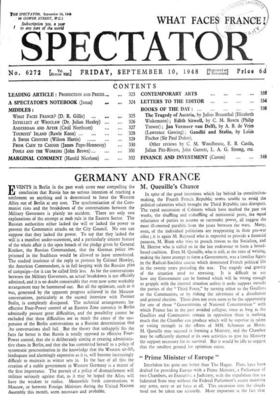GERMANY AND FRANCE
EVENTS in Berlin in the past week come near compelling the conclusion that Russia has no serious intention of reaching a settlement on anything and is determined to force the Western Allies out of Berlin at any cost. The synchronisation of the Com- munist riots and the breakdown of the conversations between the Military Governors is plainly no accident. There are only two explanations of the attempt at mob rule in the Eastern Sector. The Russian authorities either lacked the will or lacked the power to prevent the Communist attacks on the City Council. No one can suppose that they lacked the power. To say that they lacked the will is a manifest under-statement, and a particularly sinister feature of the whole affair is the open breach of the pledge given by General Kotikov, the Russian Commandant, that the German police im- prisoned in the Stadthaus would be allowed to leave unmolested. The studied insolence of the reply to protests by Colonel Howley, the American Commandant, is in full keeping with the Russian plan of campaign—for it can be called little less. As for the conversations between the Military Governors, an actual breakdown is not officially admitted, and it is no doubt conceivable that even now some workable arrangement may be hammered out. But all the optimism, such as it was, generated by the apparent progress achieved in the Moscow conversations, particularly at the second interview with Premier Stalin, is completely dissipated. The technical arrangements for effective Four-Power control of an Eastern Zone currency in Berlin admittedly present great difficulties, and the possibility cannot be excluded that these difficulties are as much the cause of the sus- pension of the Berlin conversations as a Russian determination that `the conversations shall fail. But the theory that unhappily fits the facts far better is that Russia is totally opposed. to effective Four- Power control, that she is deliberately aiming at creating administra- tive chaos in Berlin, and that she has committed herself to a policy of systematic procrastination in the knowledge that the Western air-lift,
inadequate and alarmingly expensive as it is, will become increasingly difficult to maintain as winter sets in. In the face of all this the creation of a stable government in Western Germany is a matter of the first importance. The pursuit of a policy of dismantlement will militate seriously against that, as it may be hoped the Allies will have the wisdom to realise. Meanwhile fresh conversations at
Moscow, or between Foreign Ministers during the United Nations Assembly this month, seem necessary and probable.


































